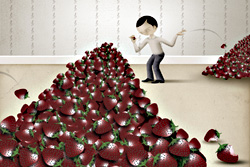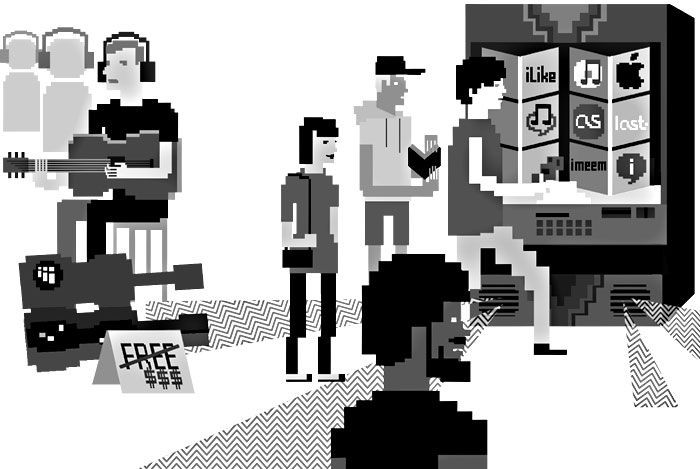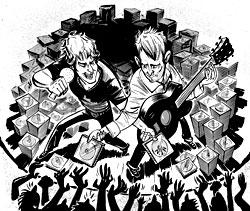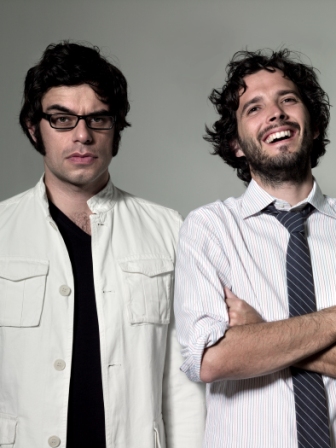There was a time in my life when I knew what I wanted to listen to, when I was poor but bought CDs anyway. I had stacks of CDs, purchased with enthusiasm and knowledge shared among friends. Finances stopped counting, however, once I discovered Napster and CD burning. When I started storing my music onto my computer, saving songs was no longer a physical, deliberate effort; a mouse-click sufficed. And I kept on clicking.
I’m now closing in on 95 gigabytes—just over 22,000 songs, or 53.7 continuous days—of music. Much of it I’ve never listened to, but in love and rock ‘n’ roll (ditto jazz, electronica, novelty bubblegum pop, and Bhangra), there’s little logic to be found once passion gets in the way. One might say that I have too much music readily available at my fingertips; one, namely Google VP Sukhinder Singh Cassidy, might say that this trend is only going to be exacerbated. In November, at an industry conference in Singapore, she predicted that by the year 2015, a storage device the size of an iPod will be able to hold 4 terabytes. In seven years, every song ever recorded in the world will fit in our pockets.
“What I can say about it is that the average 14-year-old can hear more music in a month than someone would have heard in an entire lifetime just 300 years ago,” says Dan Levitin, psychologist, McGill University professor, and author of This Is Your Brain on Music. Thanks to digital music distributors like CD Baby, the Orchard, and IODA, any independent musician’s songs can now appear on iTunes; and heaps of old songs are finding new life in digital files. According to Apple spokesperson Tom Neumayr, more than 6 million songs are now in the iTunes Store.
This means two things: (1) I have 5,978,000 songs to go, and (2) “It’s too early to say how this will affect our relationship with music,” says Levitin. “You could imagine it going either way—we might become more attached because we have so much choice, or less because the choice causes us not to bond or bind to a particular musical piece.”
What we like depends on our expectations, and though it’s hard to not get your hopes up at the thought of loving a few of those 6,000,000 songs, it’s actually demanding more of those Natalie Portman-esque “life-changing” songs—rather than enrolling in the Zach Braff “School of Pleased Head Nods”— that’s bound to frustrate. It’s a difference social psychologist and Swarthmore professor Barry Schwartz, author of The Paradox of Choice: Why More Is Less, calls maximizing versus satisficing.
“As the number of options increases, people will likely be less satisfied with the results of the choice than they would have been had there been fewer options. The level of certainty people have about their choice decreases. And the anticipation that they will regret their choice increases,” writes Schwartz in a recent essay, “Can There Ever Be Too Many Flowers Blooming?” (Answer: yes.)
Why people desire what they do is intrinsically linked to imprinting, our state during early experiences, and reinforcement—and what gets hammered into our psyches is as influenced by the size of the hammer as it is by our psyches themselves. This is what allows intelligent people to enjoy the Spice Girls because of long-lost friends, tequila, and an impromptu “If You Wanna Be My Lover” karaoke session, but not that genius John Cage piano concerto that their friends find annoying.
Karaoke and Led Zeppelin reunions notwithstanding, a glut of choice means we spend less time listening to the same music as others, reducing reinforcement. Music’s increased portability—thank you, technology—leads to more personalization when we do listen to music, leading to “increasing dissatisfaction with radio, music CDs, and any other noncustomized form of music consumption,” states Charles Areni, a professor at the University of Sydney who studies environmental psychology, music, and cognition. “Since consumers can now customize their music environments, any “one size fits all” approach will not make anybody happy.” (Prime example: Absolutely no one sings along with John Mayer while shopping at Safeway.)
Schwartz identifies changes from our habit of listening to singles, too. “Less album listening means that people aren’t forced to listen to things that don’t turn them on right away, and as a result, tastes change less.” Yep: Having 6 million songs at hand means that tastes actually change less. It’s a common predicament for anyone wanting to expand their tastes, knowing that there’s no reason to listen to, say, the end of a song, much less an entire album you don’t “get” right away. Even though it ultimately will expand my palette, do I really have the patience to get into heavy metal when I already know I love Spoon?
Having so much at hand so easily lets the overwhelmed morph from choosers—people actively involved in critical evaluation—into pickers. “‘Picking’ is much more passive,” states Schwartz. “You lie on your couch as options come by on a metaphorical conveyor belt, and you pick one that appeals to you….This is the ultimate paradox: cultural pluralism leading to individual isolation, and cultural energy leading to individual passivity.”
Faced with such an overwhelming amount of music, most people are fine settling into choice-simplifying filters. The danger with such inundation is that we’re unaware of how dependent on filters we are and how they filter in the first place. Hence, all of those jocks listening to Top 40 (a cheat sheet of the songs least likely to cause social scorn) and all of those hipsters on Pitchfork and the Hype Machine. And don’t forget about the kids and their MySpace, “discovering” new music by checking out which other bands are the “Top Friends” of their favorite bands. (These bands tend to overlap demographically to a calculated degree, as managing MySpace pages becomes big business.)
We’re forced to leave out a lot, possibly never even finding the song that will change our lives, and it’s to our benefit to be OK with it. But how can I deny myself the potential to hit the jackpot when pressing “shuffle” is as easy as pointing? I never had this problem in high school, listening to OK Computer on repeat; at the gym, my iPod is like a remote control or a slot machine, flicking through 500 songs, searching for another emotive spike. I now find myself getting bored, even in the middle of songs, because I can. The paradox of spending so much time changing songs, trying to find one that you like—without giving it time, meanwhile thinking about what else you could be listening to—is that you wind up attached to none of them. (This sentiment should also resonate with single people in their 30s.)
“Yes, there is too much music product, and most of it is terrible,” says Peter Crabb, an assistant professor of psychology at Penn State University. “Kids can spend more time trying to figure out what to listen to and fiddling with their computers and MP3s than actually spending quality time listening to good music.”
And there is good music out there. As Ravi Dhar, Ph.D., the director of the Center for Customer Insights at the Yale School of Management and a professor of psychology, says, “At some point, one has to stop looking for the best strawberries and start eating them!”








